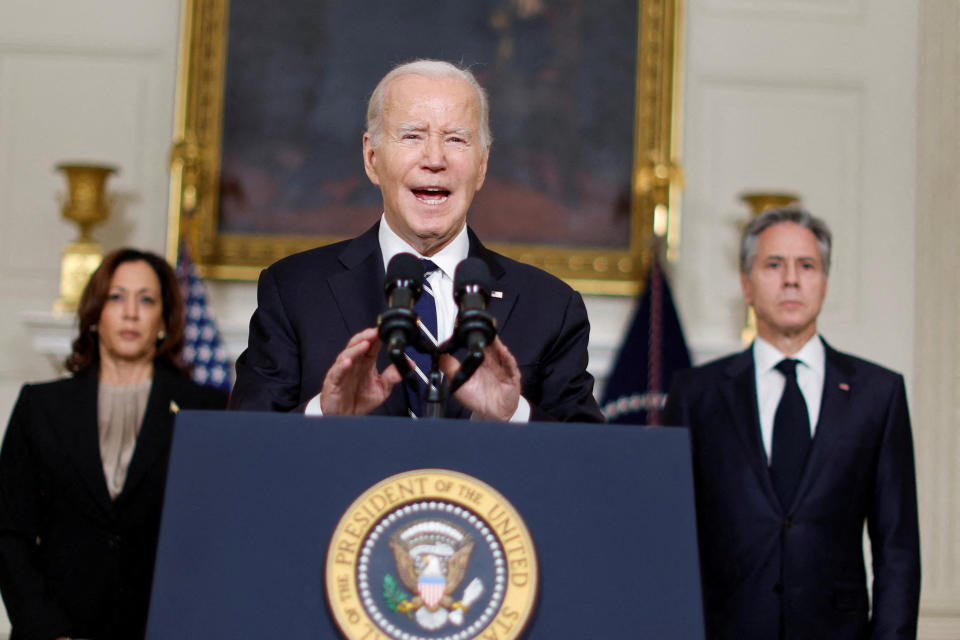Biden Calls for ‘Urgent Action’ on Israel Aid, but the Path in Congress Is Unclear

As war rages on in Israel and Gaza, President Joe Biden and congressional leaders have pledged to provide emergency military support to Israel, but the lack of a House speaker and ongoing disarray among House Republicans are raising questions about just what the U.S. government might be able to do and how an aid package might be structured.
Biden said Tuesday that at least 14 Americans were among the more than 1,000 killed in the barbaric assault by Hamas terrorists on Saturday, and American citizens are also being held hostage. Biden called the attack “an act of sheer evil” and said there is no justification for terrorism.
“We stand with Israel. And we will make sure Israel has what it needs to take care of its citizens, defend itself, and respond to this attack,” Biden said in remarks from the White House.
Biden said the United States is surging military assistance, including ammunition and rocket interceptors, and would look to do more. Israel now receives some $3.3 billion in military funding a year and the annual defense bill passed by the House and Senate earlier this year reportedly directed $80 million to Israel’s Iron Dome defense system.
“When Congress returns, we’re going to ask them to take urgent action to fund the national security requirements of our critical partners,” Biden said. “This is not about party or politics. This is about the security of our world, the security of the United States of America.”
Combining aid for Israel, Ukraine and Taiwan: As Biden’s comment about “critical partners” suggests, the administration and some lawmakers are reportedly looking at linking funding for Israel and Ukraine.
“I think there’s discussion about putting Israeli funding with Ukraine funding, maybe Taiwan funding and finally border security funding. To me that would be a good package,” Rep. Michael McCaul, the Texas Republican who chairs the House Foreign Affairs Committee, told reporters Monday.
In a Wall Street Journal op-ed published Monday, Senate Minority Leader Mitch McConnell also backed a broader emergency funding package. “Congress has the opportunity this fall to provide emergency appropriations to the Defense Department so that it can assist partners like Israel, Ukraine and Taiwan, as well as invest in our own military capabilities,” he wrote. “This should include significant replenishment funding, which allows us to expand and modernize our own weapons inventories. It should also include investments to expand our ability to produce critical munitions, long-range fires, and other essential defense technologies here in America.”
Other Republicans want to keep Israel and Ukraine aid separate. “Aid to Israel needs to be focused on Israel,” Republican Rep. Jim Banks of Indiana wrote on X. “Lumping support with Ukraine funding needlessly holds up aid to our most important ally in their hour of need.”
Further complicating matters, the House GOP conference is also still working to figure out who it wants to succeed Kevin McCarthy as speaker.
House Republicans met this evening in the Ways and Means Committee room to hear from their two leading candidates for the gavel, Reps. Steve Scalise of Louisiana, the House majority leader, and Jim Jordan of Ohio, who heads the Judiciary Committee.
Heading into the meeting, neither man had enough support to win a floor vote, according to reports, leaving tremendous uncertainty over a planned Republican conference vote Wednesday to pick a nominee.
Whoever the next speaker is, they will have to navigate ongoing Republican opposition to Ukraine funding, as Karoun Demirjian of The New York Times lays out:
“Democrats and Republicans are divided, even within their own party ranks, over whether the broad political consensus behind backing Israel’s war effort might help break the logjam over sending more military supplies to Ukraine, or simply complicate the heavily politicized negotiations over doing so. A growing number of Republicans are resisting continued aid for Ukraine and suggesting that any additional assistance would have to come with major Democratic concessions, including more restrictive immigration laws.”
The bottom line: Ongoing uncertainty.